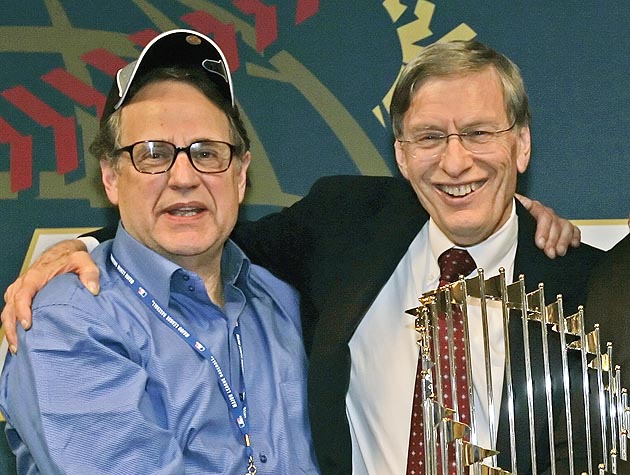
Major League Baseball is an $8 billion industry, and it takes more than funding payrolls for ballplayers to operate a team. Owners also have to pay salaries of administrators in the front office, scouts in the field, athletic trainers in the clubhouse and staff to run the minor leagues. And many of those employees are entitled to a pension, though maybe not for much longer.
ESPN New York reports that a majority of owners favor abolishing the current pension plan for non-uniformed personnel, and a vote is scheduled for May 8-9 during meetings in New York. Owners planned on a similar vote a year ago, but it was tabled when Jerry Reinsdorf of the Chicago White Sox reportedly berated and shamed the cheapskates for being petty and reckless with the futures of families dependent on a pension's security. Yes, that Jerry Reinsdorf, co-architect of the work stoppage that killed the 1994 World Series.
ESPN's Adam Rubin writes:
Reinsdorf long has been a champion of the less visible members of the MLB family. When there once was financial anxiety over the stock market crash last decade, he gave many of his employees multiyear contract extensions to ease their distress.
Reinsdorf declined to comment on Tuesday.
Reinsdorf — actually it's another officer on the White Sox board, Dennis Gilbert — organizes a yearly benefit for scouts to help raise money and awareness that many of them have gone underpaid for their work through the years. But Reinsdorf girds the program. Say what you will about Reinsdorf, but he has a long history of being loyal in a very material way to his employees. He also knows it takes more than three outfielders, four infielders, a pitcher and a catcher to make a team. He's kind of complicated.
Rubin indicates that the movement to kill the pension was started by a small-market owner.
Across the board in the private sector, defined-benefit pension plans have been in decline for the past 30 years, statistics from the U.S. Dept. of Labor show. But for the most part, it's because the industries with pension plans have been "financially stressed." That cannot be said of MLB, which just grew economically through the largest recession since the Great Depression.
Owners spokesperson Rob Manfred says that just because the owners might vote to make this pension plan no longer mandatory, it doesn't mean that one or 20 or all 30 teams won't have pensions going forward. It would just give the individual franchises "more flexibility" to create their own idea of a pension. Of course, with baseball being a cartel, the lines often are blurry on the definition of "individual franchises" with these guys.
As a fan, I don't necessarily mind the idea of each team "competing" for the best scouts and other personnel with better pension plans and whatnot. But the proletarian in me worries. Considering the amount of money MLB brings in, compared to what they're probably paying their administrative assistants — it can't be that much — why can't the owners just be grateful and treat their employees like people rather than spreadsheet characters? Do some creative revenue sharing (Dodgers and Yankees) and figure it out so the entire industry (not just ownership) stays healthy. There's no good reason to get greedy here. Oh, they'll find one, though.
Interact with @AnswerDave, @MikeOz, @Townie813 and @bigleaguestew
on Twitter, along with the BLS Facebook page!
No comments:
Post a Comment